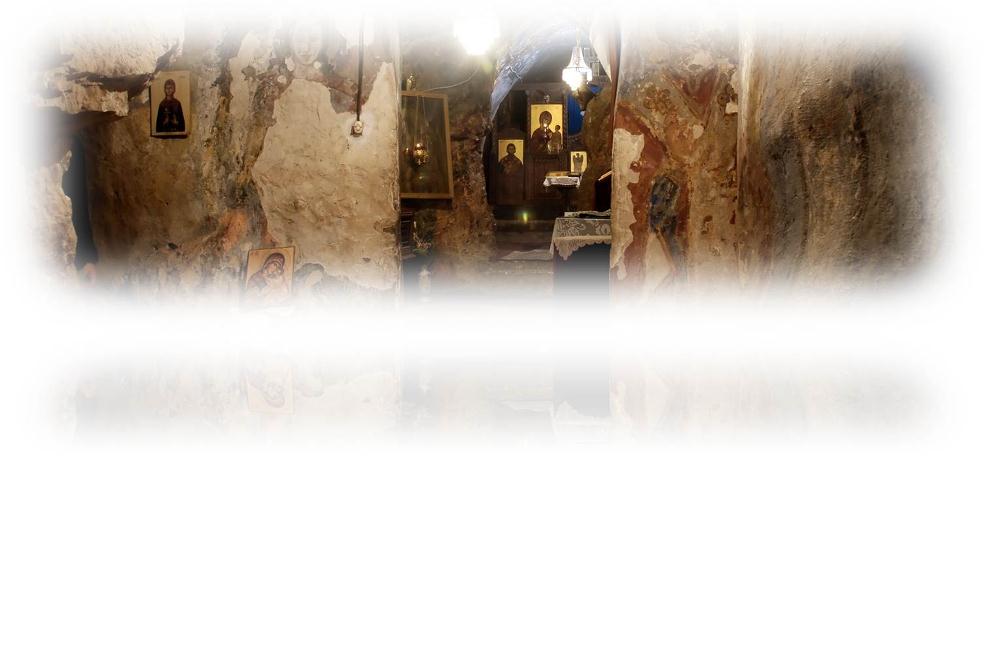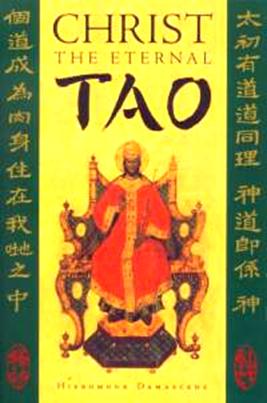CONTINUED……………
If Lao Tzu had known that the Tao, which he said dwells in lowly places that all disdain, would one day take the form of a man, he could have conceived of no greater self-emptying, no greater lowliness, no greater nothingness, than the incarnate Tao being nailed to a cross and dying in a body that would rise again.
Father Seraphim Rose once wrote that nothingness, in the meaning that Lao-Tzu gives it, is the point of convergence, or axis, of the universe. This recalls Lao Tzu’s words in the Tao Te Ching, “Thirty spokes join in a single hub. It is the center hole that is the space where there is nothing, that makes the wheel useful.” If nothingness, or self-emptying, is the axis of the universe, then the cross of Christ, the greatest sign of man of the self-emptying of God, now becomes that axis. Christ stands at the axis, and there in the space where there is nothing, we find not an impersonal void, but the personal heart of the selfless, self-forgetting God.
Now, having looked at what Christ revealed of the Tao, let us look more closely at what He has made possible for those who follow Him. Christ was the fulfillment of what Lao-Tzu had been pointing to. Through Christ’s coming, man not only achieves the one-pointed awareness and the cultivation of Te that Lao Tzu valued so much, but now in a way unknown before, man’s immortal spirit can become wholly filled with grace, or Te. To such an extent that man becomes deified by participation in the uncreated energy of God. With Christ, man not only returns to the primordial state which Lao Tzu sought, now he rises beyond even this, in the mystical union with a personal God, that was originally intended for man. Finally, through Christ, the way to heaven becomes open to man, and man experiences what Lao Tzu called the Tao of heaven, in all the fullness of His being.
By coming in the flesh and dying on the cross, the Tao of heaven took on Himself the sentence of physical death that man had brought upon himself with the fall, at his departure from the Way. And yet, the Tao, having never in the slightest departed from the Way, for how could the Way depart from Himself, was wholly undeserving of the sentence. And being the author of life, he could not be held by death. Thus, in dying as a man, and the rising from the dead, the incarnate Tao abolished the sentence of a spiritual and bodily death that had lain on human nature, offering man freedom from all the consequences of his primordial departure from the Way.
Through Christ, our union with the Tao, or Logos, can begin in this life, only to continue forever in the life to come. During his time on earth, Christ spoke of special means by which he would affect this union—Holy Baptism, which Christ called being born of water and the Spirit, Holy Confession, which Christ spoke of when He said that His disciples would have the power to bind and loose sins, and Holy Communion, which He spoke of as eating His body and drinking His blood.
From the moment one enters into these Holy Mysteries, into the sacramental life of the church, divine energy or grace no longer acts on one from the outside in, as it did upon Lao Tzu and other righteous people before the coming of Christ. Now it works from the inside out. This was the experience of Christ’s disciples, and it became the common inheritance of all followers of the incarnate Son of God.
What the early followers of Christ discovered was that the grace of the Holy Spirit was like a seed which had been implanted in their souls at baptism. Moreover, they found that they could nurture this seed through regular partaking of Holy Mysteries, repentence, self-denial, to the practice of the virtues and good deeds done in Christ’s name, and through watchfulness and prayer.
Before concluding this talk on the Tao Te Ching in the light of Christian revelation, I would like to say a few words about the last of these means of nurturing, or cultivating, divine grade—watchfulness and prayer. Tomorrow, I will speak about these in more depth.
In the Tao Te Ching,as in Orthodox Christianity, the foundation of spiritual life is watchfulness, or tension over thoughts, a state of inner vigilance and sobriety. Lao Tzu well knew this virtue. Speaking of the ancients who followed the Tao, Lao Tzu called them, “Watchful, like men crossing a winter stream—alert, like men aware of danger.” When the Tao became flesh in Jesus Christ, He spoke much concerning watchfulness. To impress upon the people the need for watchfulness, He told parables about it, such as the story of the five wise virgins who trimmed and guarded their lamps, or the tale of the unwise steward who failed to keep watch while his master was away.
Being in a state of watchfulness, Lao Tzu communed with the Tao through intuitive knowing in his higher mind, or nous. He did not speak to, or invoke the Tao, for as we have seen, the mystery of the Tao as a personal absolute, was not fully revealed to him. Now, with the coming of the Tao in the flesh, our communion with Him becomes a person-to-person connection centered in the heart. We call this prayer.
Nevertheless, even with the intimately personal communion with the Tao that has been made possible for all peoples through Christ, the basis for that communion remains the same as it was for Lao Tzu, since prayer has its foundation in watchfulness. When the Tao became man, He did not only tell us to pray, instead he said, “Watch and pray, that you enter not into temptation. The spirit surely is ready, but the flesh is weak.” First watch, He tells us, then pray while watching.
Prayer cannot be pure if the mind is actively engaged in following thoughts. For prayer to be pure, it must arise from a pure spirit, or nous, and this can only occur when one first stands watch, and this rises above thoughts and images. That is why Christ said, “Watch and pray.” Prayer and watchfulness are inseparably bound together. As St. Ignatius Brianchaninov writes, “The essential, indispensable property of prayer is attention. Without attention, there is no prayer.”
The Tao is spirit. In Jesus Christ, that spirit enters into flesh. So, too, with the inward life of his followers, who before His coming, followers of the Tao, like Lao Tzu, cultivated open, objective awareness. After His coming, that spiritual awareness takes flesh, as it were, in the form of prayer, bringing it to a new dimension. The difference between Lao Tzu and those who followed Christ after His coming, is that the latter bring into Lao Tzu’s state of observant mind, a personal communion with the Tao, usually through direct invocation. Lao Tzu said that he did not know the name of the Tao. Now we do know it, and so we invoke it, Lord Jesus Christ, all the while remembering that in order to prayer it truly, we must pray it in the spirit, and so we must first do what Lao Tzu did—be watchful.
In conclusion, let us look at the final end of man, the way to which has been opened by Christ. This end is deification. In the Orthodox Christian tradition, deification can never be an absorption into the divine essence. Divine absorption is impersonal, while true deification is a personal communion with God, face-to-face, a communion of love. Man does not become God by nature or in essence, as Christ was and is. Rather, he becomes one with God through His energy, His grace.
The deification that Christ offers us begins in this life with our entrance into the Holy Mysteries of the Church. In the Church we are called toward an ever-closer union with God, a progress that is to continue forever in the Kingdom of Heaven. “Indeed,” said St. Simeon, the New Theologian, a saint of the 10th century, “over the ages, the progress will be endless, for an end of this growing toward the end without nothing, would be nothing but a grasping at the ungraspable. On the contrary, to be filled with Him, and to be glorified in His light, will cause unfathomable progress.”
In His last talk with his disciples before His crucifixion, Christ told them, “In my father’s house are many dwelling places. If it were not so, I would have told you. I go to prepare a place for you, and if I go to prepare a place for you, I will come again and receive you to Myself, that where I am, there you may be also, and where I go, you know, and the way, you know.” When Christ said this, his disciple, Thomas, asked Him, “Lord, we do not know where you are going, and how can we know the way?” Christ replied, “I am the way.” And thus, the Way of heaven, as he had been called by Lao Tzu, became the way to heaven.
That which the ancient Greeks called the Logos, and the ancient Chinese called the Tao, came to earth to open heaven to us. He became man so that we could forever dwell in Him, and He in us. He became man so that we could experience, throughout eternity, a full participation in Him through His uncreated energy. The final end of man is eternal union with God through Jesus Christ, the only begotten Son of the unoriginate Father, the Way and Word of God, who became man for our sake. Amen.
Host: Before we start the questions, I would like to encourage everybody—Father Damascene just unloaded a lot on everybody (laughter), so I would encourage you to not allow embarrassment to impede you from asking questions. For those of you who are not Christians, Taoism as understood by Lao Tzu, is the most noble and subtle of philosophies. Father Damascene unfolded that for us. I personally know Father Damascene, I know he will be able to really break that down for you.
For those of you who are not Orthodox, this is a prime time for you to ask questions, and especially in this context, because this shows our greater understanding of God’s creation and the unification that Christ came to bring to all mankind.
Now, for you Orthodox, don’t allow you being Orthodox to keep you from asking questions, because this talk that Father Damascene just gave us, I believe, is one of the key principals to what brought so many of us to the faith, and the fact that it reveals the greater revelation of Jesus Christ and the unification and dominance in [respect to the idea?] that He brought to this planet for our salvation. So, with that, I would remind you, one question per guest, and please do not be afraid to come and ask questions.
Questioner #1: The Tao Te Chingsays that the Tao is not understandable, and that anyone that understands the Tao, doesn’t really understand the Tao. I wonder if you could speak to that, especially in the light of the role of natural revelation, as opposed to special revelation?
Father Damascene: We also say in the Orthodox Church that the essence of God, that is, God Himself, the nature of God, is not understandable, is not knowable. So in that sense, we would agree with that statement of Lao Tzu, but we also say that we can know God through His energies, the mode of existence of God in which He communicates Himself to us, and that He communicated Himself as tangibly as possible in the incarnation of Jesus Christ, the Son of Man. So, although the essence of God is not knowable, we can become partakers of the divine nature […] through Jesus Christ, and we can know as much about God as we can know, as much about the Tao as we can know, through the revelation of Jesus Christ. And we can, not only know, but participate, in God’s life.
So the Orthodox Christian life, the life in Christ, is a life of participating in God’s life, having God dwell within us, and knowing God experientially. But still, we have a distinction which the early fathers made, and even my patron saint, St. John Damascene made this distinction, and it was fleshed out more fully by St. Gregory Palamas, the distinction between God’s essence and energies. St. Gregory said that we cannot know God’s essence, but we can experience Him through His energies.
Questioner #2: Father Damascene, earlier you mentioned that Lao Tzu said that the Tao helps those that are virtuous. The Greeks, to my understanding, had a struggle with what virtue was. I was wondering if you could clarify his understanding of virtue.
Father Damascene: Lao Tzu’s understanding of virtue was basically what he described in the Tao Te Ching. He gave very clear images of a sage—the sage was the wise person. He also gave teachings to rulers, leaders of people, how to behave. Virtuous, in Lao Tzu’s understanding, would be a person who was selfless, who did not think of himself, who cared about others, who gave up his own will for the sake of those around him, who did not pit himself against others, who did not have possessiveness, ambition. “His heart is immeasurable,” Lao Tzu said.
Father Damascene: By the way, in this sense, Lao Tzu’s teaching was more like Christ’s teaching than Confucius’ teaching was, because Confucius was once asked, “If somebody does something bad to us, should we repay that with kindness?” Confucius said, “No because if you do that, then how are you going to repay the virtuous?” That’s a very practical point of view, but Lao Tzu, I think, came closer to understanding the nature of the Tao, the nature of the Logos, of Christ, and because of this, he was able to come to this higher teaching, which is to basically repay evil with good. So that would be a key to your question about what Lao Tzu would regard as virtue. Questioner #3: The term, the Tao, is referred to as “the” and it seems to me like he was trying to describe maybe a state of being or something rather than a thing, so if you could clarify that for me—what he was trying to get to. Do you understand my question?
Father Damascene: Yes, I understand. Of course, in Chinese, we do not have articles like “the” and “a,” but we do in Greek, we talk about the Logos, the Word, so Christ is called the Word of God, the Wisdom of God, so these are just words to describe the ultimate, the absolute. Perhaps there are some places when you read the Tao Te Ching that you might think he is referring to a way of being, but there are some places where he definitely talks about a kind of creator, not a creator as we know it in the Judeo-Christian revelation of creation ex nihilo.
I do not know if he fully taught that doctrine, because there is one place were Lao Tzu said, “All things arise from Tao.” Not quite the same as created and creating. But as Ji Ming Shen said, we could say that the Tao produces all things. So for Lao Tzu, the Tao existed prior to all things and all things came from Him, and all things were ordered by Him, or It. Lao Tzu might say It, but we would say Him, because we have a fuller understanding of God.
As I said, Lao Tzu did not fully understand God, or the Tao, as a person, but he described the Tao in ways that showed that he saw that the Tao had qualities like that of a person. The Tao was benevolent. The Tao only gave, never took. He cares for, shelters, nourishes, protects all things, but never seeks anything for Itself. So, as Ji Ming Shen said, the Tao of Lao Tzu is in the realm of being. The Tao is a being, the Tao is not just nothingness. The Tao has a quality of nothingness, the quality of nothingness, meaning spontaneity or selflessness, forgetting Itself.
Christ the Eternal Tao
November 2009
Learn how Eastern Orthodox Christian spirituality provides seekers of our day clear guidance on acquiring stillness, overcoming the passions, dealing with thoughts, and cultivating the virtues, as well as precise teachings on spiritual *deception, all of which* guides seekers more safely and surely on the path to communion with God (Tao – Chinese). In the profound mystical and contemplative tradition of the Christian East, seekers are able to go well beyond the realizations in Eastern religions. A long – awaited answer for those who, having turned away from modern Western religiosity, are drawn to the freshness, directness and simplicity of Lao Tzu and eastern philosophies, and at the same time are strangely, inexplicably drawn back to the all-compelling reality of Jesus Christ.
The Speaker:
Hieromonk Damascene (Christensen) is an Eastern Orthodox priest, monk and spiritual child of ascetic and spiritual struggler Bl. Father Seraphim Rose, of St Herman of Alaska Monastery, Platina, California. Fr Damascene is the author of Fr Seraphim Rose: His Life And Works and Christ The Eternal Tao, as well as numerous articles on Eastern Orthodox faith, doctrine and spirituality.

















